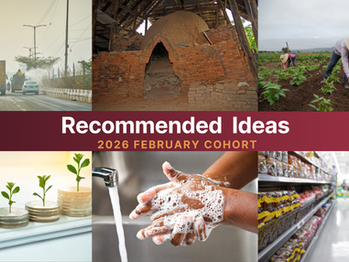Search


Introducing our newest charity recommendations—from mobile contraceptive clinics to digital mental health care
Introducing our newest recommended ideas We are excited to share four new charity ideas recommended for the September 2026 cohort of the Charity Entrepreneurship Incubation Program. Over the second half of 2025, we evaluated a range of interventions aimed at improving health and wellbeing in low- and middle-income countries (LMICs). This round focused in particular on two broad areas: improving access to essential health services where delivery systems remain weak, and addre
Crystal Lam
3 hours ago4 min read


Charity Entrepreneurship Program Applications are Open & New Charity Ideas
We’re excited to announce that we’ve opened applications for the Charity Entrepreneurship Incubation Program for the following cohorts: September 2026 Cohort: September 14th - November 4th, 2026 February 2027 Cohort: February - April, 2027 (exact dates TBD) This post summarises the four new charity ideas recommended by our research team for the September 2026 round . Apply here Applications close on March 22nd , and successful candidates will receive offers by June 8th . For
Crystal Lam
7 days ago5 min read


Announcing four new charities!
We are thrilled to introduce four new charities from our latest Charity Entrepreneurship incubation round! Collectively, they have secured $696,000 in seed funding to kickstart their ventures. Read on to learn more about these newly incubated organisations and how you can support their impact journeys! Short Summaries First Embrace Over 2 million babies die every year. That’s 4 babies every minute. 80% of these are low-birth-weight (LBW) newborns. We can change this. Kangaroo
Crystal Lam
Dec 11, 202510 min read


Announcing the new AIM CEO!
We, the AIM Board and outgoing CEO Joey Savoie, are delighted to announce that Samantha Kagel has been selected as AIM's new CEO, effective December 1, 2025. Over the last few months, we have been engaged in a highly important activity: finding AIM’s next CEO. This was not an easy position to fill, as we sought someone who could lead the organization to high growth and impact while retaining the core elements that have made AIM unique. We were committed to conducting a thor
Crystal Lam
Dec 1, 20252 min read


Why Applying to the Charity Entrepreneurship Program Can Transform Your Career - Even If You Don’t End Up Founding
TL;DR: Not everyone who applies to or participates in the AIM Charity Entrepreneurship Program ends up founding a new nonprofit. But thanks to our mentorship, Plan B support, and network - our Silver Medalists - those who apply but don’t found, make it to the final round, or who found and later pivot - go on to impactful careers across the nonprofit ecosystem. From program directors to researchers to recruitment managers, our track record of connecting participants to high-i

Selina Schreiner
Sep 23, 20253 min read


Want to start a Philanthropic Organization? Announcing AIM’s New Charity Entrepreneurship Round
A special edition of our flagship CE program, focused on increasing the effectiveness of the philanthropic sector. TL;DR: Each year, AIM...
Crystal Lam
Sep 10, 20253 min read


Introducing our newest charity recommendations—From Reducing Brick Kiln Emissions to Securing Scale-up Funding for Alternative Proteins
Introducing our newest recommended ideas We are excited to recommend six new impactful charities for the February 2026 Charity...
Crystal Lam
Aug 20, 20254 min read


Charity Entrepreneurship Program Applications are Open & New Charity Ideas
We’re excited to announce that we’ve reopened applications for the Charity Entrepreneurship Incubation Program for the following cohorts:...
Crystal Lam
Aug 4, 20255 min read


Presenting five new charities from our 2025 Spring cohort!
We are thrilled to introduce five new charities from our 2025 Charity Entrepreneurship Incubation Program Spring Cohort! Collectively,...
Crystal Lam
Jun 11, 20258 min read


Impact Review: Updates from Charity Entrepreneurship’s Incubated Organisations
Ambitious Impact’s Charity Entrepreneurship program has now been running for over 5 years, launching more than 50 charities across...
Crystal Lam
Jun 5, 202516 min read
